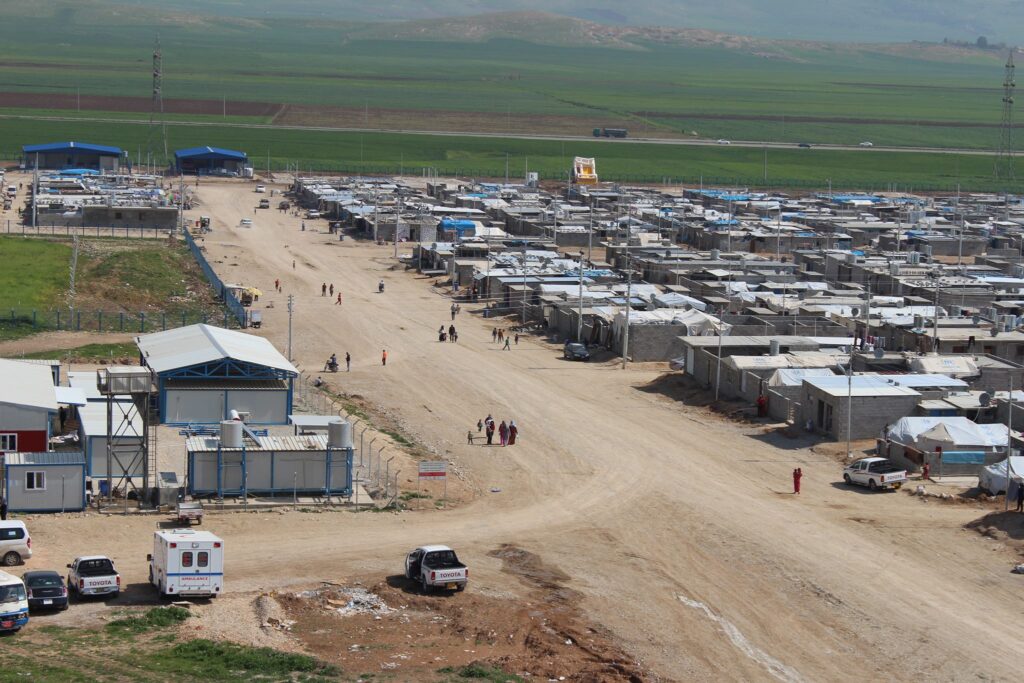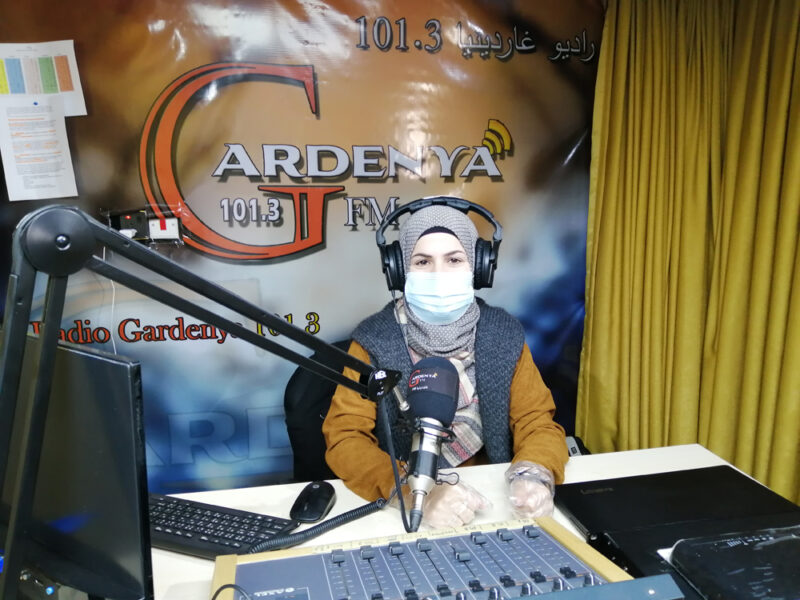Radio Gardenya dà voce ai profughi curdo-siriani fuggiti in Kurdistan iracheno
di Laura Sestini
(incipit in italiano – testo in inglese)
La guerra siriana e l’estendersi dell’invasione dei mercenari di Al-Qaeda e Isis/Daesh nei territori iracheni e siriani hanno generato centinaia di migliaia di profughi. Donne, uomini, anziani e bambini sono stati in breve tempo sradicati dai loro affetti e dalle loro abitazioni e costretti a cercare riparo in altre aree, talvolta varcardo le frontiere delle nazioni confinanti.
È questo il caso delle migliaia di persone che vivono tuttora ad Arbat Camp, un immenso campo sterrato – a qualche decina di chilometri a sud della città di Sulaymaniyah – aperto a ottobre 2013 dall’UNHCR (l’Alto Commissariato delle Nazioni Unite per i Rifugiati) al fine di ospitare i profughi curdo-siriani di Nord- Est che hanno cercato rifugio nel Kurdistan iracheno.
Tornare nei territori di provenienza – dove ricostruire una vita più stabile e ospitale rispetto al campo – non è infatti facile, a causa della mancanza di sicurezza dovuta sia all’invasione turca della Siria di Nord-Est – avvenuta a ottobre 2019 – sia ai nuovi focolai di jihadisti. Non va inoltre dimenticato che moltissimi edifici e aree sono stati ridotti in macerie da quasi dieci anni di guerra e restano tuttora da ricostruire.

Per rendere più umana e meno triste la vita da profughi, all’interno del campo sono state portate avanti diverse iniziative utili sia a coloro che sono costretti a viverci e sia a coloro che, collaborando a detti progetti, possono sviluppare nuove competenze.
Tra le altre, nel 2017 nasce Radio Gardenya, un’emittente in modulazione di frequenza con un raggio di trasmissione di circa 10 chilometri, i cui programmi hanno come obiettivo primario l’informazione dei rifugiati residenti nel campo e raccontare la vita stessa delle persone al suo interno, oltre che far conoscere la vita del campo all’esterno. Quello che avrebbe dovuto essere, secondo il programma di UNHCR, un luogo di transito, di fatto in breve tempo si è trasformato in un paese dal perimetro rettangolare, le cui strade di intersecano a spazi regolari, in orizzontale e verticale.
Per conoscere meglio questa esperienza mediatica, abbiamo posto alcune domande agli speaker e i coordinatori – Shireen, Khalil, Suhaila e Swan.
Arbat refugee camp is rather large: how many people does it count?
R.G.: «The number of Syrian refugees is about 10,000 people».
Did the majority of the people come from the Syrian war, or are there also Iraqi IDPs? Which is the most common ethnicity?
R.G.: «All the people are from Syria and most of them are Kurds from North-East of Syria; the camp is inhabited by Syrian refugees only».
When was Radio Gardenya founded? And what was the idea behind? Was it a real need, just a way to make the camp more cheerful thanks to a bit of music, or did you mean to take active part in the local context?
R.G.: «The radio went through two steps. The first step was in 2017 when the radio was established by the Italian INGO Un Ponte Per|UPP in Iraq, Kurdistan Region, thanks to the European Union Regional Trust Fund in response to the Syrian Crisis (the so-called Madad Fund). In the UPP center at Arbat camp many trainings in media field (practical and theoretical) were run with the help of the local radio, in Halabja city – called Denge Nwe. The trainings lasted nearly 6 months. In addition, other trainings were run by Al-Salam radio in Erbil city. We have to mention also the training run by Francisco Diaso, an Italian trainer who encouraged us and had an important role in running the radio. Francisco’s training (practical and theoretical) lasted 10 days and he taught us how to host programs, editing and, in general, the technique. The second step started when some participants showed interest in working as volunteers; so we could ask them to host programs on a daily or weekly basis. We have ten male and female volunteers».
How far from the camp is it possible to listen to the radio?
R.G.: «Gardenya FM is local radio that broadcasts within 10 Km. Unfortunately, we are not a web radio due to our limited equipment. But we do hope to have this chance in the near future so as to spread the voice of the Syrian refugees all around the world».
The staff consists of two coordinators and two speakers, female and male, doesn’t it? Are there any specific reasons for this choice?
R.G.: «The radio is run by two staff members of UPP (one female and one male) with many volunteers of both sexes taking part in developing our programs and helping us in preparing the daily and weekly reports with news from Syria and from inside the refugee camp. The camp coordinator and the project coordinator, each time, manage the desired output in order to fulfill the goals of the different projects and their specific programs. Some programs are done by donors – while other donors just give an idea on how the programs should be or on which topics. Other programs are done directly by our staff. As a team we co-operate to do and host programs positive for the projects, donors and, most important, for the life of the refugees inside the camp».
What do coordinators do?
R.G: «All the members of the team work and plan activities, reports and programs together. Cooperation is necessary for any successful program, taking into consideration also our daily duties and the output of the activities related to each project that support our radio».
What the speakers do is easier to spot, but who designs the programs? Each on their own or are the ideas developed together? R.G.: «The members of the staff (Khalil & Shireen) work together and plan all the radio programs, with the support of the UPP camp coordinator and the project manager».

How many hours a day does the radio broadcast? In which language or languages are the programs? Live programs allow listeners to ask for a song?
R.G.: «The radio broadcasts from 9.00 am to 4.00 pm, from Sunday to Thursday. It broadcasts in Arabic and Kurdish. We have also live programs, which are rebroadcast the following day».
How can you describe your programs? How many listeners do you have? Are they young, very young or of all ages? Are there programs dedicated to the Arbat camp refugees?
R.G.: «We work on different topics each day. We have programs on social cohesion and equality, acceptance, coexistence, PVE and stability. We are working now on a few awareness-raising campaigns. For example, a campaign that focuses on general health & Covid-19 inside the refugee camp; another on education inside Arbat camp and the effects of the global pandemic on education. We have news on daily activities inside the camp and about NGOs that support families by distributing hygiene kits or essential commodities. We also broadcast announcements from the camp management, which is very important. Our radio is on Facebook and we post visual reports relating to our campaigns (as above); the activities of UPP center (or of NGOs) and its projects; and news from inside or outside the camp. FB is useful to communicate with the outside and to know what’s going on inside the camp. We have 3,150 followers and you can find us to this link: https://www.facebook.com/2157481724482721/posts/2247734418790784/
How did you become a radio speaker, and how do you feel when you are sending your messages to listeners? It’s a responsibility, ins’t it?
R.G.: «Apart from the trainings I talked about, we tried to improve ourselves and worked hard. We are not journalists (Khalil is an English teacher, Shireen is a school teacher) but we wanted to be part of something different and believed that this is a good opportunity to try this kind of job. We are very glad to share news and pieces of information useful for our families, friends and listeners. We think that it is a responsibility because you have always to seek the truth and check the accuracy of the information».
Sabato, 26 dicembre 2020
In copertina: Shireen. Foto cortesemente fornita dalla direzione di Radio Gardenya.




